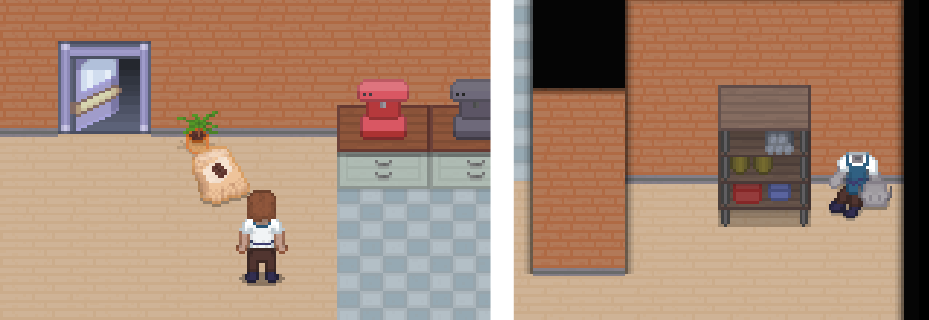We’re about one month into these devlogs, and we haven’t actually given a verbose pitch about what the vision for the game actually is. Let’s change that:
Dark Roast Chronicles is a game where you’re thrown into the role of a café manager in a busy futuristic world. You’re responsible for keeping your establishment afloat, both economically and in terms of quality. However, you’ll eventually learn that this world is a harsh one, and survival is nevre a given. But death is not the end, at least not for you, as divine power have a plan in mind for you, and may even throw you a bone or two to help out in your journey
So, in summary: a management game with a twist! To be honest, I don’t really find the “X with a twist“ phrasing to be the most engaging, as most games can be described as such, but it is still a very efficient way to narrow down the context we’re working within. The twist in this case is of course the death aspect, which goes hand in hand with the roguelite meta-progression structure.
Death
By having death as a looming threat in the game, the stakes are naturally raised, at least compared to other management/tycoon games. However, simply raising the stakes for the sake of it is seldom a recipe for success. Instead, the emphasis here isn’t on the stakes being higher, but rather that the stakes are different. Different stakes usually leads to different gameplay: imagine what your favorite game would play like if you added death/romance/economy and made it vital to the progression.
Meta-Progression
When you sell coffee and make a profit, that’s regular progression in this game. Meta-progression, however, would be when you unlock a magical tree that gives you some free coffee beans every morning, so you don’t have to spend as much on ingredients. What makes it meta is simply that it exists outside of the game world, and affects the regular progression. The plan is to have something like a tech tree of what we call divine favors, which are different supernatural effects or items that you’ll get access to in-game when they are unlocked.
Why?
Making this game as a classic management game, where you grow your café gradually over time, would have been a valid decision. The game’s title wouldn’t fit as well, but that can always be changed. But we love making games, and shaking up a traditional genre sounds like a fun challenge. In addition, the thematic flavoring that comes with time travel and divine intervention is something we find to be very intriguing. With that being said, it is important to design the game in such a way that all the major mechanics involved are jutified in their existence.
New Features
Ingredients in the Pantry
A big part of running an establishment is to manage resources. For a café, one of the most central resources are the coffee beans. Brewing one cup of coffee will now require and consume 50 beans, and 1 clean cup. Clean cups are acquired when cleaning your dirty cups, and beans are delivered to your door every morning. Currently you get exactly one bag every day, and you’re automatically charged for it, but soon we want to add an interface for managing those orders, so you can actually control your economy.

Customer Reviews
You are far from the only café in town, and in order to attract customers, you need to keep up a good reputation. When you serve a cup, you’ll get paid, but if to coffee was too cold, served to late, or the venue too dirty, they will not be very satisfied. After a visit, a customer might write and publish a review. These reviews can be go in both directions, but they will be based on that customers experience during their visit. The rate of which customers show up at your door is directly related to the average 1-5 rating of the last 10 reviews, so you better stay on top of your game!
Daylight
For a game with an active day/night cycle, it’s usually not enough to simply show the time of day in the UI and be done with it. The different phases of the day should also affect other game systems. The most obvious one is of course lighting, by emulating the movement of the sun. Any level of scientific accuracy is irrelevant to this game, so instead we aim to just provide a general feeling to the beginning, middle, and end of the day. This is implemented using the DirectionalLight2D node in Godot, one for each scenario, and then animating their energy property with tweening to make smooth transitions, based on signals from our GameTime singleton.
Conclusion
Once again, we’re shaking up the devlog format a bit, as the art/tech/design categories have a lot of overlap, making it harder to write a focused text without referring back and forth all the time. Feel free to give us some input of what formats you find to be easier to follow, and stay tuned for the next one!


